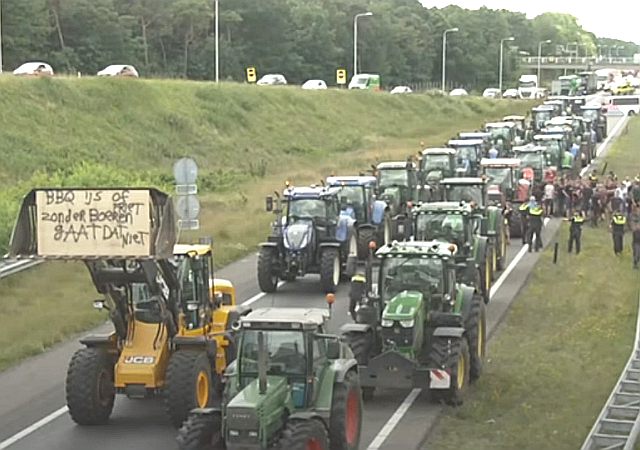EU Approves Dutch Government’s Plan to Shutter Farms, ‘Forced Sales’ Not Ruled Out

A new plan approved by the European Union will allow the Dutch government to buy-out farms and bar the displaced farmers from ever returning to their way of life.
The buy-out scheme is part of the EU’s plan to cut greenhouse gas emissions by destroying the European farming sector. “A key part of the Dutch strategy involves buying up and halting work at farms responsible for large-scale emissions of nitrogen,” the Associated Press noted Tuesday.
The so-called “voluntary definitive closure” plan, approved by the European Commission (the EU’s executive arm), will ban farmers, who sell their livestock farms to the state, from returning to livestock farming in the Netherlands or anywhere else in the European bloc.
“Under the schemes, the beneficiaries guarantee that the closure of their production capacity is definitive and irreversible, and that they will not start the same breeding activity elsewhere in the Netherlands or within the EU,” the EU declared in a statement issued Tuesday.
The scheme worth over $1.60 billion seeks to close around 3000 farms across the Netherlands. “Nearly €1.5 billion will be used to compensate farmers who voluntarily close farms located near nature reserves. Some 3,000 farms are expected to be eligible,” the Frech TV channel Euronews reported Wednesday. “The Dutch ruling coalition wants to cut emissions, predominantly nitrogen oxide and ammonia, by 50 per cent nationwide by 2030.” the broadcaster added.
The Associated Press reported the details of the EU-backed scheme:
Dutch government plans to drastically cut emissions of nitrogen pollution cleared a key hurdle Tuesday when the European Union’s executive arm gave the green light to farm buyout schemes worth nearly 1.5 billion euros ($1.65 billion).The plans to reduce nitrogen deposits — mainly by livestock farms — on EU-designated areas of vulnerable nature have sparked heated debate and widespread protests by angry farmers in this small nation that is a major producer and exporter of farm products. Dutch agricultural exports were worth 122.3 billion euros last year, according to the national statistics office.The Dutch ruling coalition wants to cut emissions of pollutants, predominantly nitrogen oxide and ammonia, by 50% nationwide by 2030. It was not immediately clear how much of that target could be met using the EU-approved funds. Some 3,000 farms are expected to be eligible. (…)A key part of the Dutch strategy involves buying up and halting work at farms responsible for large-scale emissions of nitrogen. However, that required confirmation from the European Commission that the buyouts do not amount to state aid that is banned under EU rules.Margrethe Vestager, Executive Vice-President in charge of competition policy, said in a statement that the two schemes approved would clear the way for the “voluntary closure” of farms responsible for major nitrogen emissions. (…)
The EU-backed plan may also include ‘forced sales’ that will allow the government to kick unwilling farmers from their land. “The commission approval is key to the success of the plans, which envisage thousands of farms close to environmentally sensitive areas closing down and does not rule out forced sales,” the media outlet Dutch News reported.
The government is ramming though the scheme despite massive protests from the farmers and large parts of the population. The pro-farmers party has emerged as the biggest political force in the Netherlands. In the regional elections held in March, the Boer-Burger Beweging (BBB), or Farmer-Citizen Movement became as the largest party, beating Prime Minister Mark Rutte’s ruling conservative VVD party.
EU plays with global food supply
The wholesale destruction of the Dutch farming sector will disrupt the European and global food supply. The Netherlands, smaller than West Virginia, is the world’s second-biggest exporter of agricultural produce, behind the United States. The tiny country exported food products worth €122.3 billion in 2022, the Dutch national statistics office says.
The anti-farmers measure comes as the EU is pushing for insects to be inducted into the human food. “Insects in products such as pasta or bread, microalgae, and single-cell proteins derived from wood could feed and nourish humans and animals in the future,” an EU report published in 2020 claims.
Earlier this year, the EU gave green light for several types of insects to be allowed in food items consumed by humans. “The maggot-like larvae of lesser mealworms — a type of shiny black beetle — and house crickets will become the third and fourth insects that can be sold as food for people in the European Union, Germany’s state-run DW TV reported late January. “Eight more applications await approval.”
CLICK HERE FOR FULL VERSION OF THIS STORY